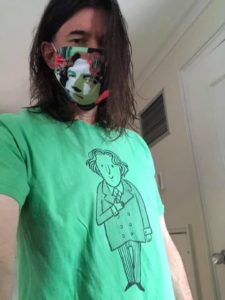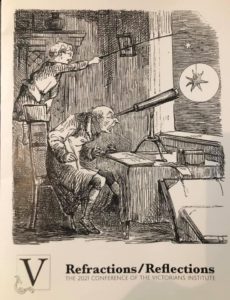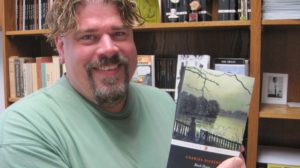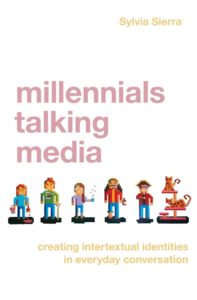
Professor of English Chris Foss, wearing an Oscar Wilde T-shirt.
On October 22, Professor of English Chris Foss presented a paper entitled “Reflection and Refraction in Oscar Wilde’s ‘The Selfish Giant’ and Clio Barnard’s The Selfish Giant” at the annual conference of the Victorians Institute in Charlotte, NC.
Foss first examined Wilde’s literary endorsement of fantasy over realism as a valuable entry point for considering Victorian reflections on disability and freakery, in particular where the nexus of poverty and disability-aligned difference is concerned. Seeing the Giant’s peculiar body as aligned with other nonnormative ones, especially freakish bodies, opens a new appreciation for how the story stands out relative to many other Victorian literary representations of disability.

Victorians Institute Program Cover
Wilde’s prison literature testifies to the extent to which Wilde’s own enfreakment and enfoolment in jail provided profound personal experiences of physical and psychological illness/disability that led him to refract but ultimately retain the tenor of his fairy tale. In the second half of the paper, Foss suggested how Barnard’s 2013 film both builds upon and departs from its Victorian predecessor’s approach. While employing a decidedly darker and unrelentingly realistic lens, Barnard’s film reinforces Wilde’s exposure of the ill treatment of and the damage done to disability-aligned bodies/minds, as well as his emphasis upon love and responsiveness in the face of suffering and loss.
Bringing together the reflection and refraction of Victorian ways of seeing disability-aligned difference through the pairing of these two texts compellingly supports the value of continuing the conversations around disability that Wilde’s Victorian fairy tales prompted over 125 years ago.






 “This book examines how a group of U.S. Millennial friends in their late twenties embed both old media (books, songs, films, TV shows) and new media (YouTube videos, video games, and internet memes) in their everyday talk for particular interactional purposes. Multiple case studies are presented featuring the recorded talk of Millennial friends to demonstrate how and why these speakers make media references in their conversations. These recorded conversations are supplemented with participant playback interviews, along with ethnographic field notes. The analysis demonstrates how the speakers phonetically signal media references in the speech stream, how they demonstrate appreciation of the references in their listening behaviors, and how they ultimately use media references for epistemic, framing, and identity construction purposes, often (but not always) when faced with epistemic, or knowledge, imbalances as well as interactional dilemmas, or awkward moments in interaction. The analysis shows how such references contribute to epistemic management and frame shifts in conversation, which is ultimately conducive to different forms of Millennial identity construction. Additionally, this book explores the stereotypes embedded in the media that these Millennials quote, and examines the effects of reproducing those stereotypes in everyday social life. This book explores how the boundaries between screens, online and offline life, language, and identity are porous for Millennials, and weaves together the most current linguistic theories regarding knowledge, framing, and identity work in everyday interaction, illuminating the interplay between these processes.”
“This book examines how a group of U.S. Millennial friends in their late twenties embed both old media (books, songs, films, TV shows) and new media (YouTube videos, video games, and internet memes) in their everyday talk for particular interactional purposes. Multiple case studies are presented featuring the recorded talk of Millennial friends to demonstrate how and why these speakers make media references in their conversations. These recorded conversations are supplemented with participant playback interviews, along with ethnographic field notes. The analysis demonstrates how the speakers phonetically signal media references in the speech stream, how they demonstrate appreciation of the references in their listening behaviors, and how they ultimately use media references for epistemic, framing, and identity construction purposes, often (but not always) when faced with epistemic, or knowledge, imbalances as well as interactional dilemmas, or awkward moments in interaction. The analysis shows how such references contribute to epistemic management and frame shifts in conversation, which is ultimately conducive to different forms of Millennial identity construction. Additionally, this book explores the stereotypes embedded in the media that these Millennials quote, and examines the effects of reproducing those stereotypes in everyday social life. This book explores how the boundaries between screens, online and offline life, language, and identity are porous for Millennials, and weaves together the most current linguistic theories regarding knowledge, framing, and identity work in everyday interaction, illuminating the interplay between these processes.”

